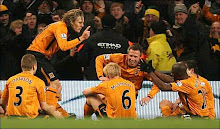The next visit of United to the KC is the day after Boxing Day and we'll see a different Manchester United side to the team of fringe players and kids whom turned out on the final day of last season. The Premier League was won and so Sir Alex Ferguson protected all of his first-choice players for the imminent Champions League final, despite hollow threats and advanced excuses from City's relegation rivals in the north east of what may happen were he to do so.
In a way, it turned out best for all concerned. United won, so Ferguson couldn't be declared culpable at all for someone else's fate, and the north east clubs below City in the table each lost, meaning they had the opportunity to climb above the Tigers and save themselves and couldn't take it. It was a way to end the season that weighed heavy on the nerves but the Tigers' task was complete.

It was the first time Ferguson had brought a team to Hull City since the autumn of 1987. The clubs were drawn to face one another in the second round of the League Cup, then sponsored by Littlewoods, having been given the usual bye in the first round. The photo shows England captain Bryan Robson and City striker Andy Saville.
The Tigers were in good form in the Second Division under Brian Horton, having beaten Oldham Athletic at Boothferry Park four days before journeying with confidence to Old Trafford. Ferguson was in his first full season and was still building, slowly, his first decent team. Trophies of any type were absolutely essential and the League Cup was highly prized in the days when there was no European cash cow for the biggest names while the ban on English club prolonged.
Horton picked his strongest available side, with men now regarded as club legends featuring in the starting XI - Tony Norman, Peter Skipper, Richard Jobson, Garry Parker and Garreth Roberts were all in the side. Frozen by the occasion, however, City were thumped 5-0 and now, with the tie lost, had to restore some respectability to the scoreline when United came along to Boothferry Park a fortnight later.
Ferguson picked a similarly strong side again, only making concessions by putting youthful peripheral figures like Billy Garton and Liam O'Brien on the bench. Horton's team had beaten Manchester City in style at Boothferry Park and lost at Sheffield United before United pitched up. In a game befitting of the total dead rubber the occasion had become (though 4,000 more people came to watch such a pointless event, than saw fit to attend the big Manchester City game) Brian McClair scored the only goal with a second half close range effort. It ended 6-0 on aggregate. United eventually lost to Oxford in the last eight.
Older supporters will tell you that the previous visit of Manchester United in 1974/5, when the visitors were briefly a Second Division club, was far more enjoyable. The two teams were performing essentially as equals and City won 2-0. The first of these goals became the penultimate League goal of the great Ken Wagstaff's career, while another old head, Malcolm Lord, put away the other. The photo shows City left winger Roy Greenwood taking on Martin Buchan of Manchester United.

And even more aged fans will talk about the extraordinary, precedent-setting Watney Cup game of the early 1970/1 season, when the two sides fought out a 1-1 draw and ended up partaking in the first ever penalty shoot out in competitive football. This was Ian McKechnie's moment of history, with the courageous City keeper of almost a decade's service becoming the first custodian to save a penalty in a shoot out, making Denis Law simultaneously the first player to fail to score. Being a proper limelight hogger, McKechnie went on moments later to become the first keeper to take a penalty in a shoot out. And for good measure, he duly became the first to miss one.
In a way, it made him famous for footballing reasons as all this marvellous servant and brave keeper otherwise achieved was a reputation for having oranges lobbed at him by City fans before matches. United won the tie 4-3 on penalties, lost the final to Derby County, and City wouldn't win a shoot out for another 36 years.
And of course, the most arcane of City supporters will point to Raich Carter's side reaching an FA Cup quarter final in 1949, which saw more than 55,000 people squash into Boothferry Park. United, in the early years of Matt Busby's reign, won 1-0 thanks to a dubious Stan Pearson goal and went on to lose in the semi-finals to Wolverhampton Wanderers. A larger crowd has never seen a Hull City home game before or since, and never will.
On Sunday, the current Manchester United incarnation turns up at the KC, notably short of healthy defenders. Maybe it's time for another occasion for a game between these two clubs to become the stuff of legend.



.jpg)






